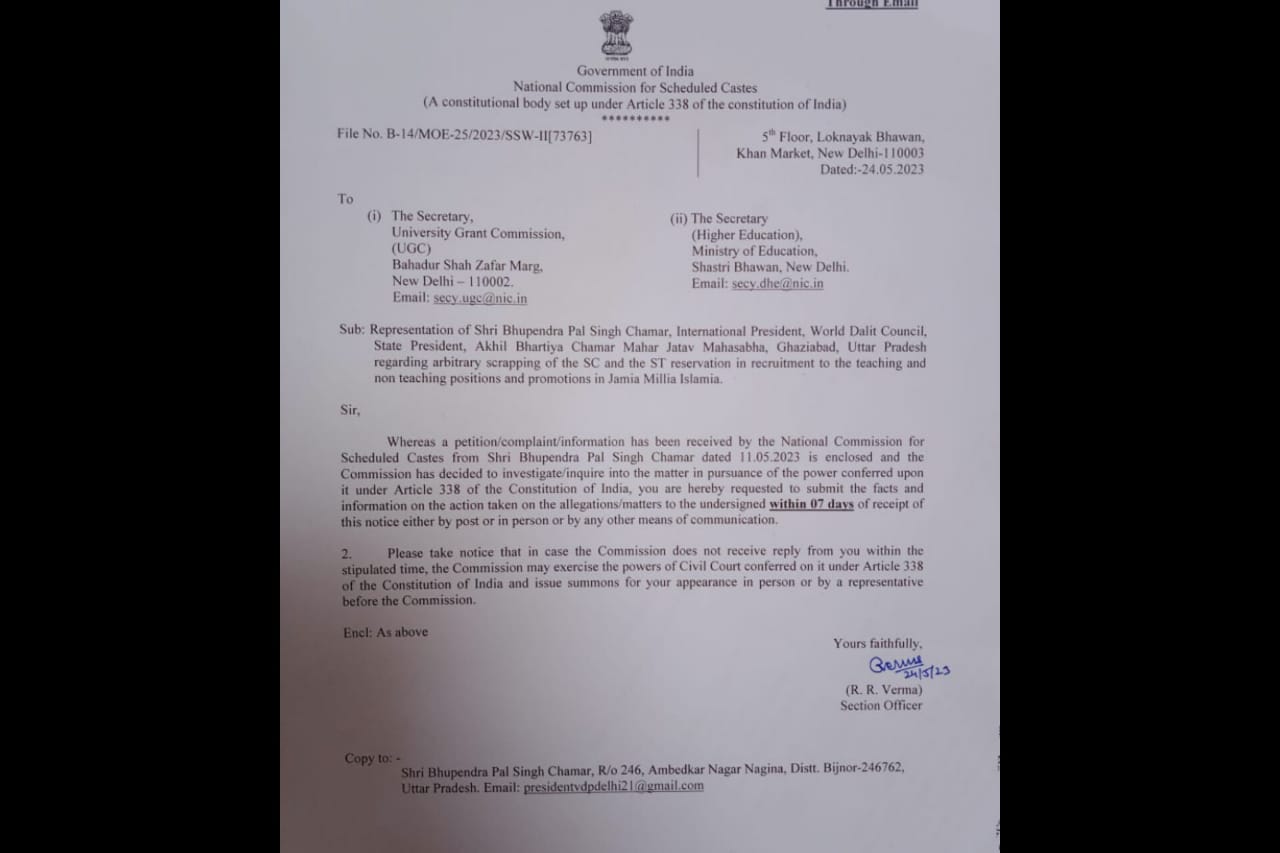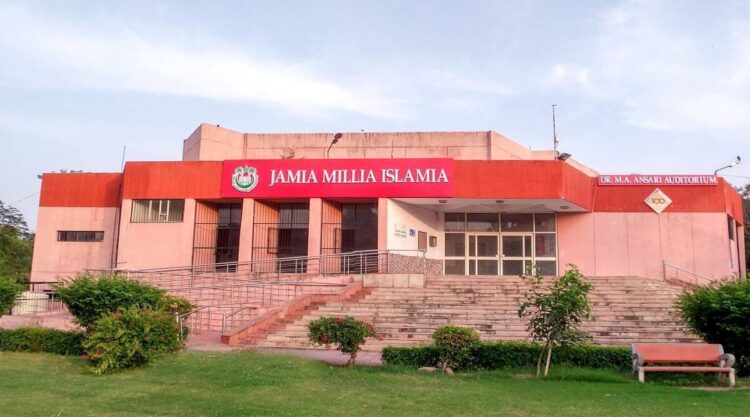On May 18, 2023, the state president of Akhil Bhartiya Chamar Mahar Jatav Mahasabha, Bhupendra Pal Singh sent a letter to the Vice-Chancellor (VC) of the Jamia Millia Islamia. Singh informed Jamia’s VC that the National Commission for Scheduled Castes has received this complaint to investigate irregularities in the appointment procedure in the teaching and non-teaching staff of the SC and ST communities in the university.
He further asked the VC to submit facts and information about action taken on the concerned matter within seven days from the receipt of the notice. He also informed the VC that if he fails to file a reply within the stipulated time, then the commission may exercise its powers under Article 338 of the Constitution of India and summon his appearance before the commission.
On May 11, the World Dalit Council sent a letter to the National Commission for Scheduled Castes against the arbitrary scrapping of reservations for the Scheduled Castes and Scheduled Tribes at Jamia Milia Islamia in recruitment and promotions of teaching and non-teaching staff.
The letter states that the university has violated the UGC Guidelines. The university has to ensure its adherence to the reservation roster before notifying job advertisements, and the same must be put up in the public domain after due approval from the Ministry of Education. However, the letter claims that the Jamia Milia Islamia did not follow the reservation roster “on its flimsy, fictitious and self-assumed and executed status of Minority Status under Article 30(1) of the Constitution of India, charged up with the verdict of the National Commission of Minority Education in 2011.”
The letter also claims that the same cannot be enforced as long as JMI Act remains unamended. The letter states, “The claim of the university is bogus, misleading and extremely atrocious towards the SC/ST community of the country.”

“Minority Institution” on Government Funds
Jamia Millia Islamia is a central university under the act of parliament. The institution was also granted a minority institution status in 2011 by the National Council of Minority Educational Institutions (NCMEI). However, the fact that the institution was not run or administered by any minority community people was blatantly ignored by the council. The status however is being challenged in the High Court of Delhi, via writ petition.
With the institution becoming a minority institution, the reservation for the scheduled tribes and scheduled caste students were abolished completely in 2011. With this the appointments from these categories were also abolished in 2014, ignoring the court proceedings.
The university became a central university under the Jamia Millia Islamia Act 1988, the university is administered by this act and is funded by the consolidated fund of India. Before 2011, the university used followed the reservation policy of the government of India both in admissions and appointments.
Even after being the matter sub-judice the university closed the SC-ST cell. Since 2014 as many as 200 to 300 appointments have been made in the university in both teaching and non-teaching staff but not a single appointment was made from the deprived community. Apart from the appointments, the institution is also depriving opportunities to students belonging to the SC-ST communities who can get benefits from the institution.
Although the institution is listed as a minority institution but it is still governed by the act of 1988, as per which, the university should be open to all persons and that nothing in this section shall be deemed to prevent the university from making appropriate provisions for reservations for SC, ST, PH or women.
It is pertinent to mention that, when NCMEI handed over the minority status to the university, not a single member from the scheduled caste or scheduled tribe commission was party to this council. The NCMEI had said in its order, “Jamia was founded by the Muslims for the benefit of Muslims, and it never lost its identity as a Muslim minority educational institution”. It added the University was thus, “covered under Article 30(1), read with Section 2(g) of the National Commission for Minority Educational Institutions Act”.
The order was challenged in the Delhi High Court soon after the orders were passed. Despite the pending case, the University scrapped SC/ST reservations and approved religion-based appointments and reservations in 2014, citing the NCMEI order of 2011. The two cases pending in the apex court and the High Court of Delhi nowhere ordered a stay on appointment and promotion of candidates from SC/ST community under reservation as per the Law.
As per the reports, 50 percent of the seats in admissions are reserved for Muslim students, where 30 percent of seats in each programme are reserved for Muslim applicants, 10 percent for Muslim women applicants and 10 percent for Muslims hailing from Other Backward Classes or OBCs and Scheduled Tribes or STs.
Furthermore, 5 percent of seats are reserved for those who pass their Class 10 and Class 12 Exams from Jamia School. Another 5 percent are reserved for students from Kashmir. Similarly, 10 percent of seats are reserved for students from foreign countries and 5 percent for disabled students.
However, the as per the reservation provided by the government the SC-ST students should be provided with 15 and 7.5 percent reservation.
Back in July 2022, National Commission for Scheduled Caste issued summons to the Vice-Chancellor of Jamia Millia Islamia, to appear in person before the Commission on July 19, 2022. The summons was issued by the Chairman of the Commission in a case related to caste-based atrocities and removing the constitutionally guaranteed reservation of Scheduled Castes and Scheduled Tribes in appointment and promotion by the university authority based on the complaints filed by one Harendra Kumar before the Commission.
Government of India’s 2018 Affidavit
In 2018, the Government of India submitted an affidavit before the Delhi High Court against the affidavit submitted by the previous government and opposed the minority status given to Jamia Millia Islamia University by NCMEI.
The Government of India’s 2018 affidavit states that “it is the statute that established the institute and not the minority. Once the statute incorporates it, it can never regain its characteristic as a minority institution.” The affidavit further said, “In any event, the Board of Jamia Milia Islamia is elected and need not necessarily consist of majority belonging to the Muslim religion. The question of it being a minority institution does not arise.”
The affidavit further said that the National Commission for Minority Educational Institutions Act, 2004, which states the competence and jurisdiction of the NCMEI, does not authorise the declaration of a university created by a statute as a minority institution.
The affidavit concluded that Jamia Milia Islamia is not a ‘minority institution’ as it was established through the Act of Parliament and is funded by the Government of India, and not set up by a minority sect.



















Comments